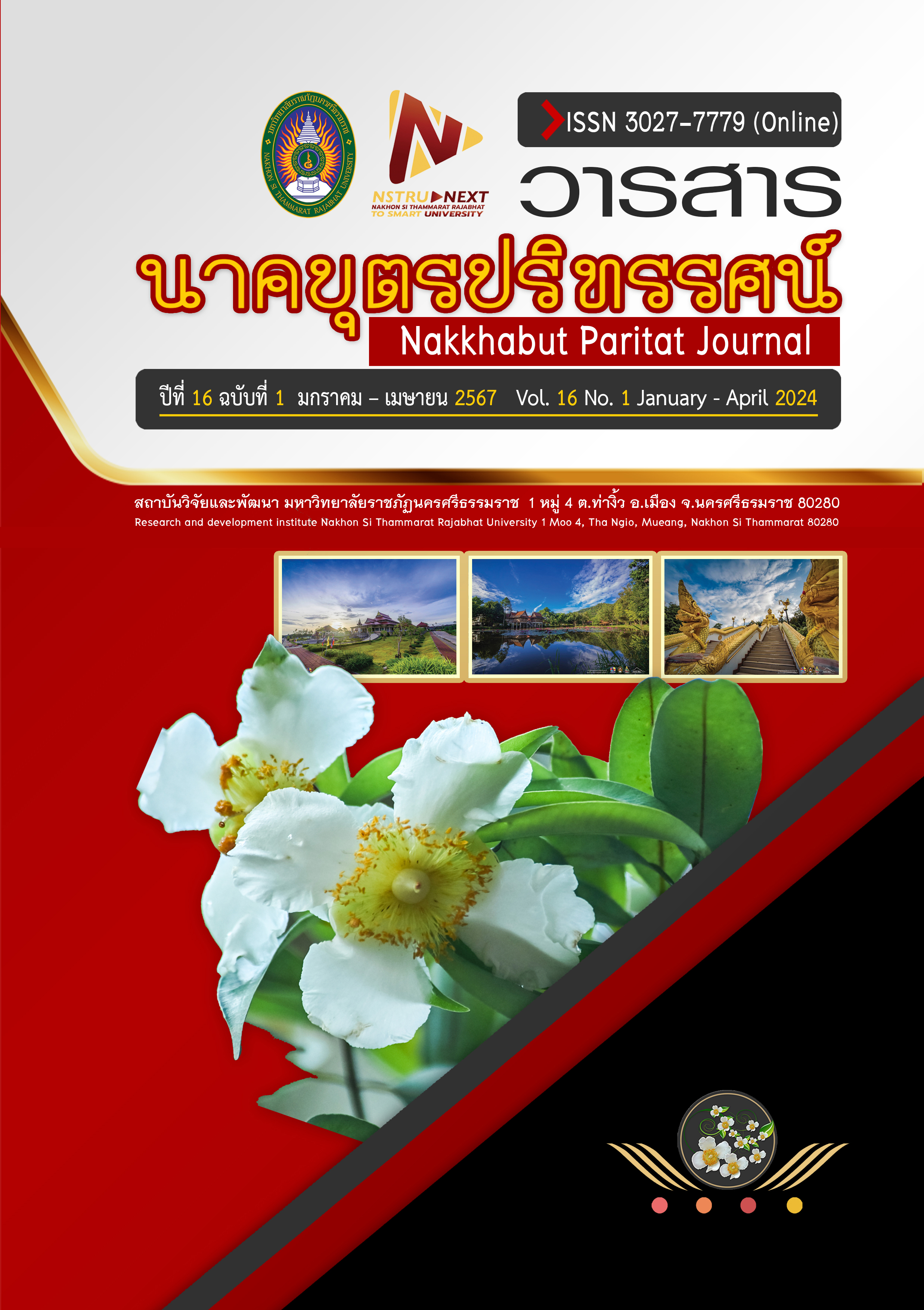การพัฒนาคุณภาพชีวิตประชาชนในจังหวัดนครศรีธรรมราชตามแนวพระพุทธศาสนา
Main Article Content
บทคัดย่อ
งานวิจัยนี้มีวัตถุประสงค์ ดังนี้ 1) เพื่อศึกษาแนวคิดและทฤษฎีการพัฒนาคุณภาพชีวิต 2) เพื่อศึกษาหลักธรรมในการพัฒนาคุณภาพชีวิต 3) เพื่อบูรณาการคุณภาพชีวิตประชาชนในจังหวัดนครศรีธรรมราชตามแนวพระพุทธศาสนา 4) เพื่อนำเสนอองค์ความรู้เกี่ยวกับการพัฒนาคุณภาพชีวิตประชาชนในจังหวัดนครศรีธรรมราช ตามแนวพระพุทธศาสนา เป็นการวิจัยเชิงคุณภาพ (Qualitative research) โดยรวบรวมข้อมูลทางเอกสาร (Documenty Investigation) และเก็บข้อมูลจากการสัมภาษณ์เชิงลึก (In-depth Interview) และจัดเวทีเสวนากลุ่ม จากผู้เชี่ยวชาญและผู้ทรงคุณวุฒิ จำนวน 16 รูป/คน เครื่องมือที่ใช้ในการวิจัย ได้แก่ แบบสัมภาษณ์ และวิเคราะห์ข้อมูลโดยวิธีพรรณนา ผลการวิจัยพบว่า 1) การมีชีวิตที่ดีมีความสุขมีความสมบูรณ์ มีการดำรงชีวิตอยู่ในระดับที่เหมาะสมตามความจำเป็นพื้นฐานในสังคม พร้อมที่จะพัฒนาตนเองให้เหมาะสมกับการเปลี่ยนแปลงของสังคมและสามารถดำรงตนเองให้เป็นประโยชน์ทั้งต่อตนเองและสังคม องค์ประกอบของคุณภาพชีวิตสามารถสรุปได้ 5 ด้านคือ (1) ด้านร่างกาย (2) ด้านอารมณ์ (3) ด้านสังคม (4) ด้านความคิด (5) ด้านจิตใจ 2) หลักธรรมในการพัฒนาคุณภาพชีวิต พบว่า หลักมัชฌิมาปฏิปทา และ หลักไตรสิกขา เป็นหลักธรรมที่สนับสนุนให้มีความรู้และเข้าใจในการดำเนินชีวิต สามารถพัฒนาคุณภาพชีวิตของบุคคลผ่านกระบวนการฝึกฝนอย่างเป็นระบบเพื่อการดำเนินชีวิตที่ถูกต้อง 3) การบูรณาการคุณภาพชีวิตประชาชนในจังหวัดนครศรีธรรมราชตามแนวพระพุทธศาสนา พบว่า ด้านร่างกาย/ด้านสังคมบูรณาการเข้ากับศีล ด้านอารมณ์/ด้านจิตใจบูรณาการเข้ากับสมาธิ ด้านความคิดบูรณาการเข้ากับปัญญา 4) องค์ความรู้เกี่ยวกับรูปแบบคุณภาพชีวิตประชาชนในจังหวัดนครศรีธรรมราชตามแนวพระพุทธศาสนา เรียกว่า WESET Model, W คือสุขภาวะทางสังคม E คือ สุขภาวะทางกาย S คือ สุขภาวะทางจิต E คือ มีอารมณ์มั่นคง T คือ สุขภาวะทางปัญญา
Article Details

อนุญาตภายใต้เงื่อนไข Creative Commons Attribution-NonCommercial-NoDerivatives 4.0 International License.
เอกสารอ้างอิง
Fangkom, B. (2018). Tri Sikkha Community: Form and Enhancement of Quality of Life in Elderly Society, Ubon Ratchathani Province. Research Project Funded by Mahachuhalongkornrajavidyalaya University, Ubonratchathani campus. (in Thai)
Hansriworapong, K. (2018). Creating the Balance of Life according to the Buddhist Doctrines. Doctor of Philosophy (Buddhist Studies). Mahachulalongkornrajavidyalaya University. Graduate School. (in Thai)
Kaewparadai, W. (2022). Former Minister of Public Health. Interview, 15 December 2022. (in Thai)
Ministry of Public Health. (2020). Manual for following measures to relax businesses and activities to prevent the spread of COVID-19 for types of businesses and activities, Group 2. Bangkok: Ministry of Public Health. (in Thai)
Ministry of Public Health. (2020). “The Quality-of-Life Indicators of the World Health Organization, abbreviated Thai version”, Chiang Mai: Ministry of Public Health. (in Thai)
Nakhon Si Thammarat Provincial Public Health Office. (2021). Situation in Nakhon Si Thammarat Province. Retrieved from 5 August 2021 from https://www.nakhonsihealth.org/
Office of the National Health Commission. (2020). Fighting the danger of COVID-19 Change the crisis into Community sustainability. Bangkok: Office of the National Health Commission. (in Thai)
Office of the National Economic and Social Development Board. (2018). Summary of the National Economic and Social Development Plan Twelfth Edition 2017 – 2021. Bangkok: Office of the National Economic and Social Development Board. (in Thai)
Office of the Secretary of the Integrated Provincial Administration Committee, Nakhon Si Thammarat Province. (2021). Nakhon Si Thammarat Province Development Plan. Retrieved 5 August 2021 from https://www.opsmoac.go.th/nakhonsithammarat-strategic-files-401091791795
Perunawin, C. (2021) The way to balance health. Retrieved 2021, January 2, from http://www.thaihealth.or.th/blog/myblog/topic/255/. (in Thai)
Phra Brahmakunaphorn. (2021) Majchimapatipada -Majchanatassana, Kanlaylnatam-AcharaKlinsuwan. Retrieved 2021, January 2, from https://www.facebook.com/permalink.php?story_fbid. (in Thai)
PhrakruBoriharnSangkhakit. (2022). Abbot of Pak Phanang District (Thammayut). Interview, 31 December 2022. (in Thai)
PhraRajwisutthikhawee. (2022). Chief of Region 16 (Thammayut). Interview, 11 December 2022. (in Thai)
PhraThepSophon. (2018). The direction of Thai education. Bangkok: Mahachulalongkornrajavidyalaya Printing Press. (in Thai)
PhraThepwiniyaphon. (2022). Advisor to the Abbot Region 16 (Thammayut). Interview, 11 December 2022. (in Thai)
Phra Wijai Iddigo. (2018). The Quality-of-Life Development with Buddhist Integration in Akha Ethnic Group on DOI MAE FA LUANG. (Doctor of Philosophy Buddhist Studies), Mahachulalongkornrajavidyalaya University, Graduate School. (in Thai)
Sukkri, CH. (2022). Public Health Doctor, Nakhon Si Thammarat Province. Interview, 15 December 2022. (in Thai)
UNESCO. (2021). Quality of Life: An Orientation to Population Education. New York: UNESCO.
WHOQOL Group. (2020). Development of the WHOQOL: Rationale and Current Status. International Journal of Mental Health, 23(3), 24-56.


